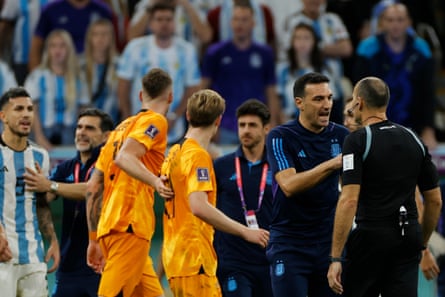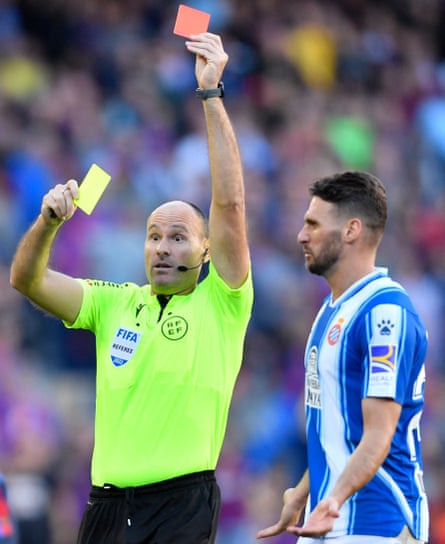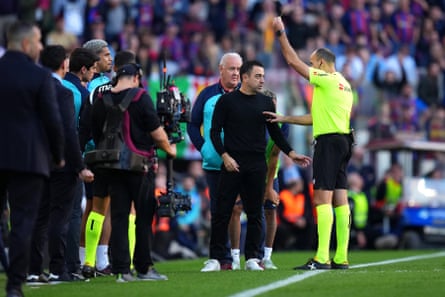Barcelona and Espanyol were a quarter of the way into their first game for more than 50 days, La Liga back at last, when referee Antonio Mateu Lahoz was suddenly set off. Urgently heading across the pitch wearing a determined look, triggered by what he heard or perhaps remembering something really important he had to do, he sprinted straight at Xavi Hernández, who was all in black and shouting. This was only ending one way. Pulling up pitchside, he grabbed Barça’s coach. And then he kissed him, whispering in his ear. “He said he was happy to see me,” Xavi revealed later. “And I said: me too.”
The Barcelona coach was speaking for everyone. Well, sort of. Turns out that the World Cup star who most marked the return of domestic football was the one who doesn’t actually play but doesn’t half perform, the Spaniard who was in Qatar longer than any other. Antonio Mateu Lahoz – Toño to his mates, which he likes to think is everyone – did it again. A record-breaker for clubs and countries, the man whose name has become a verb was mateulahozing once more this weekend. The celebrity referee who handed out 17 cards during the Argentina-Netherlands quarter-final came home and immediately went one better, and without the benefit of extra time or penalties. Two matches, 35 cards, two all-time highs, and some show to restart football in Spain.

They had been waiting for this, if not this exactly. Talking about referees is not big, not clever and best avoided. Sometimes, though, it is inevitable – and not just in Spain where it’s inevitable every time – and this was one of those. However hard you resist, Mateu Lahoz made it so on Saturday, at turns absolutely infuriating and very, very funny as he made history in the Catalan derby, providing the kind of wild New Year’s Eve where even the numbers don’t add up and the referees’ report, which must have taken him to midnight to complete, certainly doesn’t. Maybe this photo helps: Mateu Lahoz standing there like some gunslinger, yellow card in one hand, red in the other. At his side, Espanyol’s Sergi Gómez just shrugs.

“Chaos,” Frenkie de Jong called it, having somehow survived two recent meetings with Mateu Lahoz without getting a card. “I don’t know what happened exactly but the referee decided to give some red cards, I don’t know why,” the midfielder said after a match which ended 1-1, Joselu’s second half penalty equalising Andreas Christensen’s early opener.
Some? Mateu Lahoz might have forgiven Xavi with a kiss the first time but he did give the coach a red card in the 96th minute and that took him to 19: 15 yellows and four reds, one rescinded. No one has ever handed out more, his own record falling to the only man it could fall to, like the Sergey Bubka of referees. In a single afternoon, he handed out as many reds as all of the officials in Qatar put together, and one more yellow than he managed at Lusail. Which wouldn’t have surprised everyone: after that quarter-final, when most in Spain were just pleased that everyone else finally knew what they were up against, Lionel Messi admitted that Argentina’s players had been “scared because we know what he is like”.
How do I sign up for sport breaking news alerts?
Show- Download the Guardian app from the iOS App Store on iPhone or the Google Play store on Android by searching for 'The Guardian'.
- If you already have the Guardian app, make sure you’re on the most recent version.
- In the Guardian app, tap the Menu button at the bottom right, then go to Settings (the gear icon), then Notifications.
- Turn on sport notifications.
What he’s like has often been exaggerated and has also changed. In a country where every referee is a suspect, always under attack, and the cynicism and bias comes invariably not from the judged but the judges; where the officials are handed a responsibility for results they simply don’t have, some of the criticism of him is grotesque: as unfair as it is facile, the tone terrifying. Born in Valencia, where he is a PE teacher, Mateu Lahoz is one of six siblings, a father of two sons, a footballer who reached Segunda B level, and became a referee partly because his father passed away and the family needed the money. He first went mainstream a decade ago when José Mourinho praised him as the only man to let the game go, employing dialogue and not just discipline.
Soon though, the things he did well were held against him: talking to players, calling them by their first names or a number became a stick to beat him with. Chatting was a crime, smiling a disgrace. Who does he think he is?! He’s always trying to get on camera, they claimed as they turned their cameras on him, following every move, magnifying every gesture. A smile, a thumbs-up, a conversation with a player or fan, a wink to the camera or a wave to someone in the stands was proof that he should not be there. The people who accused him of thinking he is a celebrity made a celebrity of him; he’s a showman, they said, editing his showreel. He became a dog with a bad name, like Rex or Spot, an all to easily easily-identified public enemy – as if you become Spain’s representative at the World Cup, or take charge of a Champions League final if you’re irremediably awful, as if any decisions ever happen entirely in isolation.

And yet it is also true that him getting those games baffles many here and he does have his moments; true too that he sometimes seems to follow his own rules, that he’s not always easy to work out, that occasionally the discipline seems disproportionate or just daft. Or other times, non-existent. It was certainly true that sometimes players found him disconcerting, hard to predict; not least because he wasn’t always what he was supposed to be, the referee who opened dialogue suddenly deciding to shut all the doors, the chatty man turning all authoritarian. “You can’t talk to him,” Messi said of the referee who talked to them.
A little before the World Cup break, in the last minute of one match, he gave Betis’s Sergio Canales – just about the most polite player in La Liga – two yellow cards in 13 seconds. The first was for “making observations” and, after showing it, he warned Canales: “If you keep talking, I’ll send you off.” To which Canales replied: “If I can’t talk, don’t ask me about personal things, then” … and was sent off. Now, less than 24 hours after Xavi had said “I like him, he talks”, he was at it again. La Liga had never seen anything like it.
It had started early, Ansu Fati booked for using his arm – the only one of Barcelona’s eight yellow cards to be given for a foul – before Gavi and Brian Oliván were booked for “arguing with an opponent, without insults or threats”. But the golden minutes were the five or 10 that followed Espanyol’s penalty, when suddenly he was dishing out the cards like a croupier on crack. At around 73.50, Jordi Alba and Viní de Souza were booked. On 74.58, Ferran Torres was. On 75.30, it was Pedri. On 76.13, Edu Exposito. On 76.56, Alba again, a red following, discussions starting. On 79.34, Souza got a yellow and Leandro Cabrera a red – which was taken off again on 84.29, via the VAR.
In case you’ve lost track like everyone else, that’s eight yellows, two reds, one taken away again, in five minutes 44 seconds (10 minutes, 39 seconds if you count the wait for the red to be removed), and 31 seconds of actual play. Or to use the referee’s own report, there were yellow cards in minutes 74, 74, 74, 75, 76, 78, 80, 81, and reds in minutes 78 and 80. Six minutes for 10 cards. “I told him he lost control,” Xavi said. “He said: ‘Do you think?’”
Those numbers suggest a mass brawl, but there was none. A game out of control, but it was not the game that was out of control: it was a referee who didn’t so much manage the situation badly as create it.
The stats suggest confrontations, bone-crushing challenges, but there were few. Of the yellow cards handed out, only five were for fouls, yet by the referee’s own admission there were no insults or accusations. “I’m aware that sometimes I protest too much, but that wasn’t the case this time,” Alba insisted. When Mateu Lahoz booked Torres, his gaze was fixed, waiting for the Barcelona player to say something, the card out lightning fast. When he told Cabrera he had not been sent off after all, instead of contrition, there was a defiant look. Of the 10 minutes and three seconds of injury time, fewer than five minutes were played, Mateu Lahoz seeming determined to have as many unnecessary conversations as he could. Like the VAR, it’s not the decisions themselves that’s the issue – it’s what is done to the actual game.
La Liga results
Show
Girona 2-2 Rayo Vallecano, Real Betis 0-0 Athletic Bilbao, Atlético Madrid 2-0 Elche, Getafe 2-0 Real Mallorca, Cádiz 1-1 Almería, Celta Vigo 1-1 Sevilla, Real Valladolid 0-2 Real Madrid, Barcelona 1-1 Espanyol, Real Sociedad 2-0 Osasuna, Villarreal 2-1 Valencia.
Photograph: Violeta Santos Moura/X07448
Which is not always a bad thing. Because if there’s a serious point here, there is also a silly one. It may be childish to laugh but it’s also true. Worse is the way referees are attacked, there to be abused and discarded by those without the moral authority to stand in judgement, a useful scapegoat. In the final minutes, TV commentators were talking about how this was the definition of a derby but it wasn’t the derby that made this dramatic, different: it was him. One Catalan paper insisted Mateu Lahoz had “ruined the spectacle”, but that wasn’t true: he is the spectacle. “Every party needs someone to get it going,” Santi Gimenez wrote in AS, “and Mateu Lahoz was a dancefloor-filler like Chimo Bayo, capable of turning the dullest meeting into the most memorable piss-up.”
In the end, history was made and maybe it was more fun this way; and if there were many things that were Mateu Lahoz’s fault, the lack of football wasn’t one of them. Nor was the result. “I don’t blame Mateu,” said Xavi, the man he had come over to kiss at the start and sent off at the end.

 1 year ago
101
1 year ago
101










 English (US)
English (US)